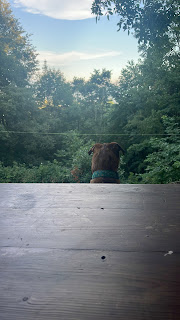I am sitting on a hilltop in northern Italy, rather completely on my own. My dog is here. I'm surrounded by insects, animals (deer, wild boars, the odd wolf, badgers, and all that). I planned for a very active summer, running at least 40 k a week, which I love doing - running long distances is literally my happy place. But then some stuff happened and I got Covid and now I just feel cellularly tired. So every day I spend quite a few hours just sitting staring out at the view.
And what I've been asking myself is that difficult, age old question: Who Am I?
When you spend hours alone, especially in a spot where silence is the overwhelming sound, you get a chance to really "dig deep" and find out what your questions are. I can't really believe that I have been inhabiting this body and mind and soul I guess for nearly 66 years and I still don't really know who or what I am. So, let me start at the beginning, well maybe not that far back but ...
Names
I guess you all know the story about how Toni Morrison got her name. Toni she decided on herself, after converting to Catholicism at age 12 and naming herself Anthony. Morrison was her husband's name and she was stuck with it because when her first novel was published she was still using it as her legal name even though they were already divorced. There's an quote floating around from 1992 that goes like this:
"I am really Chloe Anthony Wofford. That’s who I am. I have been writing under this other person’s name. I write some things now as Chloe Wofford, private things. I regret having called myself Toni Morrison when I published my first novel, The Bluest Eye.”
Well, the same kind of thing happened to me. I'd always been Niki, or Nicky when I was very young. Or Nicola when my parents were mad at me. Then in my forties I had a brush with religion - not Catholicism - and I was persuaded to change my name. So I changed it to Rivka, a name I don't even like that much, but who gets to pick their own name. And then my work as a doula, birth companion, teacher, author and my whole birth persona grew wings under the guise of Rivka Cymbalist and there I was, and here I am, just like Toni Morrison (ha!).
So, for now, Niki is reserved for my family and people who knew me before the Great Name Change. But I'm kind of getting tired of inhabiting two separate lives so I may just change my name again.
Bodies
Who knew? Bodies change. I thought the biggest change would be that infamous time when I grew breasts and got my period. Pregnancy was fun. I didn't have such a tough time with it, in fact I enjoyed growing babies. Birthing them was tough, but I really loved having little babies and children around, and breastfeeding, and those body changes didn't really bother me. Some fibroids, a touch of hyperthyroid. Nothing serious.
Menopause was kind of a relief, no more monumentally Niagara Falls cycles. No more fertility, and I was ready for that, because I was happy with my five children. Did I think I'd overdone it? No.
But then, the thing is, everyone goes on about menopause because it's when a woman is no longer fertile and I guess biologically speaking no longer useful. But the body changes more dramatically and more quickly after the whole menopause thing is history.
I've written about this before, and I have to point out, it's not specific ailments that bother me - thank goodness - I'm healthy. But just like during puberty and adolescence, and I'm imagining anyone with body dysmorphia, I just don't feel right in my skin. Its like my clothes don't fit me right, except they do. My clothes fit, I still take the same size more or less, a medium. But it's my skin that doesn't fit. It feels weird, it's too loose, it's floppy, it doesn't feel like its mine. I look funny in the mirror, who's that old lady? Why is her skin all dry? damn it, why didn't I wear sunscreen for all those years?
So that's the tunnel I can fall down when I don't remember to center and use moisturizer every morning. Yes, it is my body, yes indeed I am very grateful and proud of it, it's like an old car, just keeps on chugging. But I can't help it, it feels weird.
Profession
Oh goodness, could I just say I'm a witch? I guess not....but this is weird too because I think I studied witchery and magic my whole life, and science too of course. And poetry, and of course I learned all about having kids and all when I went ahead and had five of them.
But my professional label doesn't exist, because I'm not a registered midwife. I'm a birth companion or whatever. My Impostor Syndrome kicks in frequently; sometimes I think my actual profession is "Impostor".
I've mostly been a mother.
And the renewal part of this whole exploration? It's a deep, deep sense that change means pain, and from pain comes change. Life just doesn't stop, until it does. So, in a sense, my resting, my recovery, my reflections ... lead to a renewal of sorts which is a kind of an acceptance of the continually changing nature of my life: child, young woman, mother, older woman, mother, older woman, grandmother, mother, birth attendant, peace keeper, rebel, anarchist, runner, crone...


